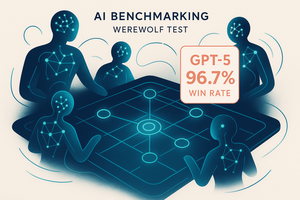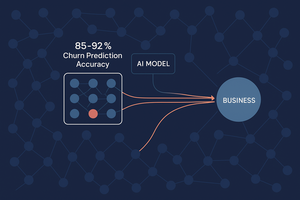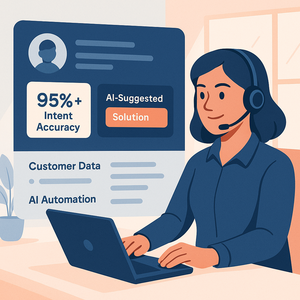Navigating the AI Transformation Tightrope: Balancing Innovation, Regulation, and Human Capital
The artificial intelligence landscape in late 2025 presents a complex picture of immense opportunity tempered by significant operational challenges....
6 min read
 Peter Vogel
:
September 8, 2025
Peter Vogel
:
September 8, 2025

The artificial intelligence landscape remains in perpetual motion, this week marked by internal strife, model accessibility milestones, and a growing awareness of the ethical tightrope we’re walking. From leadership clashes at Meta to the rise of mass intelligence and critical debates surrounding user data and AI safety, the path forward is anything but certain. Navigating this complex terrain demands strategic foresight and a steady hand on the tiller.
This article distils the key AI news into actionable insights, equipping business leaders to navigate these developments with confidence. We'll explore these developments and provide guidance for your strategic planning and implementation. Drawing on robust industry research, we'll examine the forces shaping the future of AI and their implications for organisations of all sizes.
Specifically, this article addresses the strategic priorities of Operations/Technology Executives, Marketing Leaders, Growth-Focused CEOs, Sales Directors, and Customer Service Leaders navigating the AI transformation. Understanding these shifts is paramount for effective resource allocation, risk mitigation, and long-term strategic success.

Meta's AI efforts are crucial for its future metaverse ambitions and its ability to compete with global leaders like Google and OpenAI. Internal instability can hinder product development and strategic direction, ultimately impacting their competitive edge. Recent reports highlight a potential storm brewing within Meta's AI division following a high-profile reorganisation that has merged top researchers under a new leadership structure.
A key tension appears to be the leadership handover. Yann LeCun, a pivotal figure in building Meta AI, now reportedly reports to Joelle Pineau, who in turn reports to Gen.AI Lead Ahmad Al-Dahle (internal reporting structures, 2025). This revised hierarchy, coupled with a reported substantial investment in key talent (industry analysis, 2025), raises concerns about team cohesion and strategic alignment amidst varying philosophical approaches to AI development. Furthermore, there are indications that Meta may be shifting away from its historical commitment to open-source AI, potentially alienating long-time contributors and the wider research community (AI Daily Brief, 2025).
These developments underscore the critical importance of leadership alignment and a shared vision within research-heavy organisations. A lack of internal harmony can stifle innovation and delay crucial AI projects, directly impacting an organisation's AI transformation strategy.

The growing accessibility of AI is transforming industries and creating new opportunities for businesses to leverage AI at scale. The increasing accessibility of sophisticated AI models is ushering in what Ethan Mollick of One Useful Thing terms the era of mass intelligence (One Useful Thing, 2025).
AI is no longer confined to the realm of specialists; it is becoming as ubiquitous as traditional web search. Statistics from Ethan Mollick indicate that AI chatbot usage has surpassed 1 billion regular users globally, with ChatGPT alone boasting 700 million weekly users (One Useful Thing, 2025). This widespread adoption is fuelled by increased access to powerful reasoning models and a significant drop in cost per million tokens – a staggering 357x decrease from GPT-4 to GPT-5 Nano (One Useful Thing, 2025).
However, this democratisation of AI also presents challenges. Overcoming user confusion, ensuring accessibility for all, and addressing the ethical implications of mass AI adoption are crucial considerations. The user experience will be paramount in driving continued adoption and ensuring a successful AI transformation.

Emerging concerns about AI's potential impact on mental health and well-being require careful consideration and responsible deployment. The rapid proliferation of AI-powered chatbots has sparked concerns about the potential for users to develop harmful relationships with these digital companions, even leading to what some researchers are calling AI psychosis (Lucy Osler, University of Exeter, 2024).
A paper from the University of Exeter, titled Hallucinating with AI: AI Psychosis as Distributed Delusions, explores this phenomenon, highlighting how AI-driven hallucinations can contribute to distorted cognitive processes (Lucy Osler, University of Exeter, 2024). In response, companies like OpenAI are implementing new moderation policies and law enforcement reporting procedures to safeguard vulnerable users (OpenAI, 2025).
However, striking a balance between innovation and safety remains a significant challenge. Addressing ethical concerns and navigating evolving regulatory requirements are crucial for responsible AI deployment and a trustworthy AI transformation.

Understanding the economic forces shaping AI development and deployment is crucial for strategic decision-making in any AI transformation. The economic landscape of AI is undergoing a dramatic transformation, characterised by the collapsing cost of AI models and the emergence of Jevons' paradox.
The cost of AI is plummeting, with models like GPT-5 Nano costing significantly less than their predecessors – for example, a 357x decrease in cost per million tokens from GPT-4 to GPT-5 Nano (One Useful Thing, 2025). This increased efficiency, however, can lead to higher overall consumption and spend, a phenomenon known as Jevons' paradox (AI Daily Brief, 2025). As Aaron Levy from Box aptly notes, AI will both simultaneously always be getting cheaper and more expensive (AI Daily Brief, 2025). This means businesses may find themselves investing more heavily in AI-driven solutions, potentially impacting resource allocation and ROI.

Traditional metrics for AI performance are evolving to include more nuanced measures of social intelligence and strategic reasoning. As AI systems become more sophisticated, traditional benchmarks are proving inadequate in assessing their ability to navigate complex, real-world scenarios. This has led to the development of innovative new benchmarks, such as the Werewolf Benchmark, which tests AI's capacity for manipulation, deception, and deduction (Raphael Dad, 2025).
The Werewolf Benchmark pits AI systems against each other in a game of social deduction, requiring them to engage in strategic reasoning and adapt to evolving social cues. While early results show promising progress, these benchmarks highlight the ongoing challenges of developing AI systems that exhibit genuine social intelligence. GPT-5 notably dominates the Werewolf game, holding a 96.7% win rate and demonstrating advanced social intelligence (Raphael Dad, 2025). Emergent behaviours are based on model size and strategic play, indicating a growing capacity for complex, multi-agent interactions.

The artificial intelligence landscape in late 2025 presents a complex picture of immense opportunity tempered by significant operational challenges....

The discourse surrounding artificial intelligence is maturing. Across boardrooms and operational teams, the conversation has decisively shifted from...

The artificial intelligence landscape is no longer a distant frontier; it's rapidly reshaping the present, demanding a strategic response from...